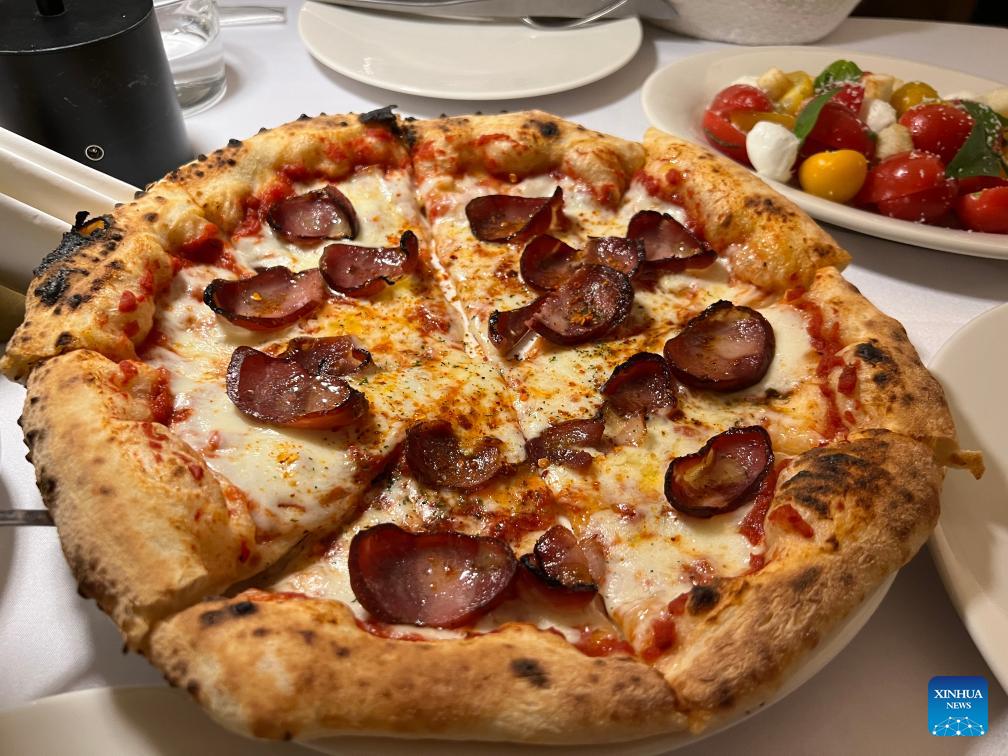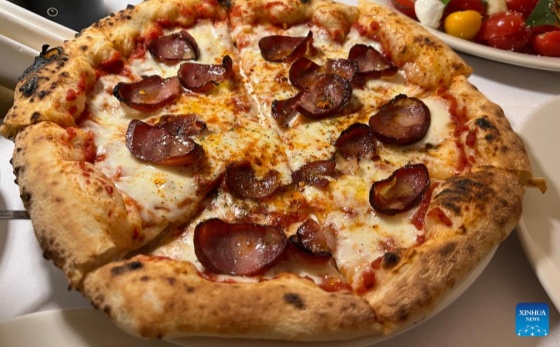West China
Across China: From panettone to pasta, China's love affair with Italian food
2024-01-13 22:53:04

This photo taken on Nov. 16, 2023 shows a pizza using sausage produced in southwest China's Guizhou Province as an innovative pizza topping, at a restaurant in Chongqing, southwest China. (Xinhua/Yang Shiyan)
CHONGQING, Jan. 12 (Xinhua) -- Panettone, a traditional festive pastry from Italy, has gained increasing popularity among young people in China over the recent Christmas and New Year holiday.
Liu Haozhe, who runs an Italian pizzeria in southwest China's Chongqing Municipality, introduced Panettone to his customers at Christmas 2023. Within five days, he baked nearly 30 loaves, which were snapped up by curious diners.
"This bread contains sugared orange peel, raisins and rum, which provide sweetness and flavor," said Liu. "The addition of butter adds a dense taste to the bread body. The towering and fluffy shape is very festive and can be shared with friends."
In Chongqing, renowned within China for its red peppers and spicy cuisine, another red color has appeared on its food map -- tomatoes, a common ingredient in Italian food.
On a local street famous for its exquisite bistros, a restaurant called Richang specializes in handmade pasta. In 2023, it was listed as a recommended restaurant by an online guide to local food. Their signature dish is spaghetti Bolognese, while it serves Tagliatelle, a form of pasta from Emilia-Romagna region, with beef and pork belly. The white wine in the sauce stimulates the aromas of tomato, carrot, onion and meat.
With such additions, the city is equipped to serve up authentic Italian flavors, with all kinds of pasta tempting the taste buds of local young people.
Richang is owned by Sun Wei, who once studied overseas and loves to eat fresh homemade pasta. She opened the restaurant because she wanted to let people in her hometown experience an authentic Italian style of cuisine.
"The taste of Italian food is more based on tomatoes, which is in line with the tastes of Chinese people," she said. "With the growing awareness of catering, Chinese people are increasingly fond of a diverse array of food. Italian food ingredients are very rich in taste, and diversified, so it can meet the needs of different customers."
The Italian Food Week held in late 2023 saw a series of food activities held in Chinese cities like Beijing, Shanghai, Chongqing and Hong Kong, including more than 30 activities in southwest China. These included tasting events, cooking classes and various types of promotional activities. At Richang, diners took part in spaghetti-making classes and learned how wheat flour is turned into spaghetti.
At Bella Napoli, a restaurant in Shanghai, diners not only eat authentic oven-baked pizza but also enjoy Italian-style performances all year round, complete with Mediterranean-style decorations.
At various bakeries across China, Italian-style bread is favored by customers. Wang Yuxuan from Beijing is a lover of Italian bread. She believes that breads such as focaccia and ciabatta are not only chewy but also low in oil and sugar, making them a good carbohydrate choice for people who want to keep fit.
As a representative of the Mediterranean diet, Italian cuisine is not just a list of foods, but more of a lifestyle that helps people maintain their health while building and strengthening social interactions.
Olive oil provides healthy oils, tomatoes inhibit the oxidation of cholesterol and reduce the risk of heart disease, and the use of spices reduces the amount of oil and salt used, making dishes light and healthy. Such food has become increasingly popular on the Chinese dinner table, as people pursue diverse health options.
As traditional Italian cuisine grows in popularity among Chinese people, such dishes are also combined with local Chinese ingredients, creating a fusion of the two countries' food cultures.
In southwest China, local ingredients collide with Italian-style food, resulting in culinary innovations. Some restaurants use tofu as a white sauce, combined with beef, Sichuan peppercorns and other ingredients, to create a Mapo-tofu style lasagna. In another local innovation, fluffy focaccia bread is stuffed with a filling of salted vegetables, and the whole thing is topped with shaobai (a kind of preserved pork with mustard greens). Likewise, in addition to traditional options like basil, locally smoked sausage can be used as an innovative pizza topping.
In an interview with Xinhua last year, Italian Ambassador to China Massimo Ambrosetti described China and Italy as "two countries with these really amazing traditions in terms of national cuisines."
"From north to south in Italy, as in China, we have so many different dishes and so many -- astronomical -- traditions, that these are really unique," he said.
Innovation also gets the ambassador's seal of approval: "I think for contemporary cuisine, a fusion is inevitable ... something which underlines the success of cuisine. I think fusion is good."
Editor:Jiang Yiwei

 手机阅读分享话题
手机阅读分享话题